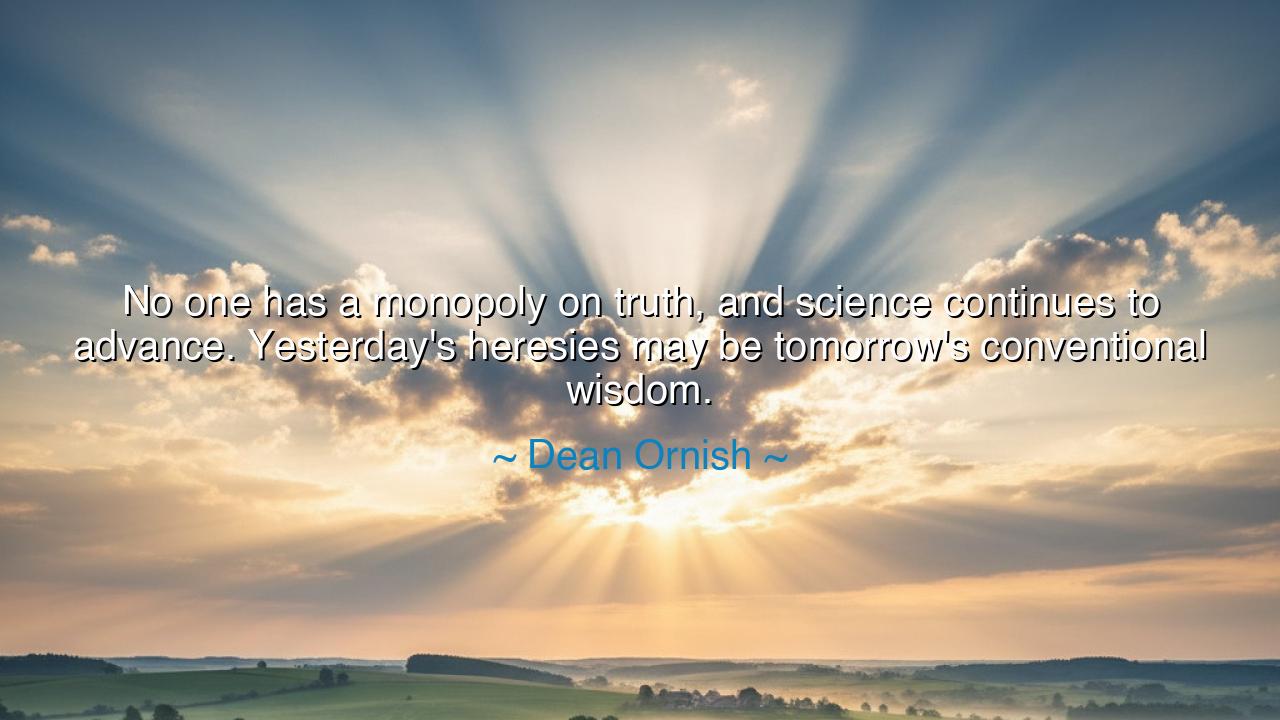
No one has a monopoly on truth, and science continues to advance.
No one has a monopoly on truth, and science continues to advance. Yesterday's heresies may be tomorrow's conventional wisdom.






Hear now, O children of wisdom, for I bring to you the words of Dean Ornish, a man who speaks with the clarity of one who has seen the relentless march of knowledge and the shifting sands of truth. “No one has a monopoly on truth, and science continues to advance. Yesterday’s heresies may be tomorrow’s conventional wisdom.” In these words, Ornish reminds us that truth is a living, breathing entity, forever evolving. No one, no matter how mighty or revered, can claim to possess the final or absolute truth. The truths we hold today may not be the truths of tomorrow, for science—the great seeker of understanding—is always pushing forward, ever in search of new revelations, new insights, new ways of seeing the world.
In the ancient world, the great philosophers and scholars were keenly aware of the ever-changing nature of truth. Heraclitus, the philosopher of flux, famously declared that “you cannot step into the same river twice,” for the world is in a constant state of change. The ancients understood that knowledge and truth were not fixed, but evolving, shaped by time, experience, and the pursuit of wisdom. Socrates himself spent his days questioning the truths of his time, knowing that wisdom was not found in absolute certainty, but in the process of inquiry and examination. Ornish echoes this ancient understanding—truth is not a possession, but a process, one that requires humility and a willingness to question even the most sacred beliefs.
Consider, too, the story of Galileo Galilei, who in the 16th century, with his telescope, dared to challenge the Church’s belief in a geocentric universe, where the Earth stood at the center of all creation. Galileo’s discoveries—that the Earth revolved around the Sun—were seen as heresies by the powers of the time. For decades, his truths were rejected, condemned, and even silenced. Yet, what was once considered heretical and blasphemous is now seen as self-evident truth in modern science. What Galileo uncovered was not the final word, but a step forward in humanity’s ever-evolving understanding of the cosmos. Ornish’s words remind us that today’s heresies may very well be tomorrow’s accepted wisdom. Science, with its relentless pursuit of truth, moves forward, continually redefining the boundaries of what we know.
Ornish also speaks to the humility required in our pursuit of truth. The greatest minds in science and philosophy are those who recognize that no one can claim to have ultimate control over the truth. It is not a treasure to be hoarded, but a flame to be passed from one seeker to another. Einstein, whose theory of relativity changed our understanding of time and space, did not believe in the finality of his own discoveries. He famously said, “The more I learn, the more I realize how much I don’t know.” Einstein knew that the truths of today could be challenged, refined, and even overturned by those who came after him. Ornish teaches us to approach truth with openness, knowing that the discoveries of tomorrow may look very different from those of today.
The lesson here, O children, is that truth is not static—it is a dynamic force that evolves with the passage of time. Science advances by questioning, by challenging the dogmas of the past and opening new doors of understanding. The truths we hold dear today may be revealed as incomplete or inaccurate in the future. Just as Galileo’s revelations were once heresies, so too may the breakthroughs of today be seen as mere stepping stones toward greater wisdom. Ornish calls us to embrace the uncertainty of this journey, for it is in the pursuit of truth, not the possession of it, that we find meaning.
In your own lives, O children, be humble in your search for truth. Do not cling too tightly to the beliefs and ideas that you hold today, for they may evolve as your understanding deepens. Whether in science, art, or philosophy, always approach knowledge with a heart that is willing to learn, unlearn, and learn again. Recognize that the truth is not an immutable fortress but a river that flows and changes with time. Be like the great seekers who came before you—Socrates, Galileo, Einstein—who knew that the path to wisdom is not a straight line, but a winding road, full of detours and new revelations.
So, O children, take heart in the words of Ornish. Know that the truth you seek is not a final destination but a journey—one that requires both patience and openness. Embrace the uncertainty and wonder that comes with the pursuit of knowledge, for it is through this journey that you will grow and evolve. The truths of today may be reshaped tomorrow, but in that reshaping, we will find a deeper, more profound understanding of the world. Let this wisdom guide you, and may your pursuit of truth always be tempered with humility, curiosity, and a willingness to see the world anew.






AAdministratorAdministrator
Welcome, honored guests. Please leave a comment, we will respond soon